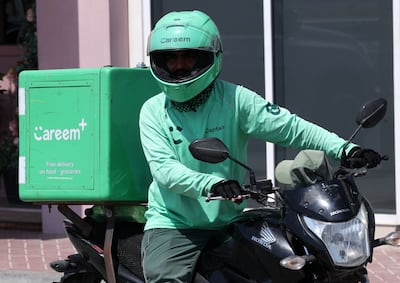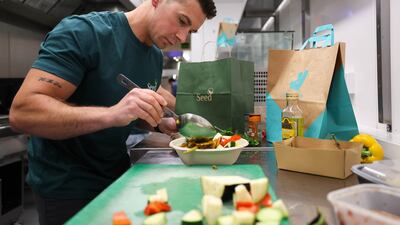As in so many regions around the world, food has long been central to Arab culture, bringing communities together and preserving traditions through nourishment and hospitality.
As countries across the GCC have modernised at a record pace in the past few decades, the foodservice industry has adapted well to fast-evolving markets.
In the past decade alone there has been a drastic transformation. While fine dining and home-cooked feasts remain central to the region’s culture, new avenues have emerged and risen in popularity.
Now, a variety of delivery services, home-based food businesses, and ghost kitchens redefine how food is prepared, served and consumed. This also makes employment and business ownership in the food sector accessible to a wider segment of the population.
The market has responded quickly to changing lifestyles, digital innovation and consumer demands. It is also important to acknowledge how fast digitisation has enabled market growth, led by governments across the region.
Food delivery has seen rapid growth across Middle Eastern markets, particularly in the Gulf. Driven by a high use of smartphones, fast and secure digital payment systems, and a rising demand for convenience, third-party delivery, many platforms such as Talabat, Deliveroo, Careem Food, and Jahez (in Saudi Arabia) have become household names.
The Covid-19 pandemic was also a prominent force that accelerated the demand for food delivery services. Lockdowns and limited access to shared spaces made home delivery across various retail sectors a convenience and, in many cases, a necessity.
According to strategy consultants Redseer Consulting, the food delivery market in the Middle East and North Africa (Mena) was valued at over $9 billion in 2022 and is projected to continue growing at a healthy rate.
This shift has resulted in ripple effects across the foodservice value chain. Restaurants that once relied heavily on foot traffic and dine-in customers had to move quickly to online ordering and last-mile logistics. Many have adopted hybrid models that blend physical and digital presences, using delivery apps and social media to maintain visibility and reach. Several businesses welcome new revenue streams that now have easy access to customers. through delivery apps.
I expect cultural influences to play a key role in driving the food delivery sector forward, offering unique selling points that combine convenience with heritage
Simultaneously, the rise of home-based food businesses has eased their entry into the food industry. With relatively low start-up costs and minimal overheads, many people have channeled their culinary skills into viable enterprises.
This has allowed young entrepreneurs and other strata of the population – who may typically have had to face challenges to working outside their homes – access to an income. Social media has become a powerful tool for marketing, order-taking and building a loyal customer base.
Governments in the region have started to formalise and support these businesses. For instance, Saudi Arabia’s Ministry of Municipal and Rural Affairs and Housing launched a licensing programme for home-based food providers, ensuring quality and safety, which empowered local talent. Oman also has a similar process that started in 2022 where every home-based business owner must obtain a license.
Home-based food businesses are often a jewel in the crown of community as they often provide niche products and traditional cuisine made with great care. The growth of this space not only makes employment and entrepreneurship more accessible but also preserves culture and heritage in an increasingly globalised world.
The other big change has been the emergence of ghost kitchens across the region – delivery-only food preparation facilities that operate without a storefront. Also dubbed "cloud kitchens", "dark kitchens" or "satellite kitchens", these spaces are created for efficiency and allow multiple entrepreneurs access to professional food preparation equipment under one roof.
Companies such as Kitopi, iKcon, and CloudEats have taken this model to scale in the Middle East. These tech-enabled kitchens use data analytics, AI and lean operations to reduce costs, optimise menus and shorten delivery times.
Thanks to cloud kitchens, foodservice entrepreneurs can now begin to operate through a low-risk expansion model without having to invest in real estate, equipment and support staff.
They can enter new markets quicker and try out culinary concepts with minimal financial investment. Add to which, consumers are enjoying an increasingly dynamic dining scene, with plenty of options and faster delivery times.
The ghost kitchen model also supports the growing trend of restaurants that maintain an exclusively virtual presence – only accessible through delivery apps without any plans to have a physical location.
Even as the transformation of the foodservice industry has been phenomenal, there are challenges that cannot be ignored. Third-party platforms, for example, charge high commission fees from restaurants, which is something to consider in a sector where profit margins are not very high. Delivery logistics have room to improve as well, with consumers and entrepreneurs in remote areas still being excluded.
The fast pace at which these concepts have been introduced and grown has meant that regulatory frameworks are still catching up. There are ways to go to ensure food safety, quality and accessibility for both operators and customers.
As GCC nations continue to embrace technology and promote entrepreneurship, the future of the foodservice industry appears to be very promising. I expect cultural influences to play a key role in driving this sector forward, offering unique selling points that combine convenience with heritage.
In the current landscape, it is important to be adaptable, digitally proficient and focus on consumers’ preferences, who will undoubtedly benefit from more choice and easier access. For aspiring and established entrepreneurs alike, this market transformation signals a new era of opportunity to innovate and contribute to their nation’s economy.
Points to remember
- Debate the issue, don't attack the person
- Build the relationship and dialogue by seeking to find common ground
- Express passion for the issue but be aware of when you're losing control or when there's anger. If there is, pause and take some time out.
- Listen actively without interrupting
- Avoid assumptions, seek understanding, ask questions
Wicked: For Good
Director: Jon M Chu
Starring: Ariana Grande, Cynthia Erivo, Jonathan Bailey, Jeff Goldblum, Michelle Yeoh, Ethan Slater
Rating: 4/5
The specs
Engine: 8.0-litre, quad-turbo 16-cylinder
Transmission: 7-speed auto
0-100kmh 2.3 seconds
0-200kmh 5.5 seconds
0-300kmh 11.6 seconds
Power: 1500hp
Torque: 1600Nm
Price: Dh13,400,000
On sale: now
The Sand Castle
Director: Matty Brown
Stars: Nadine Labaki, Ziad Bakri, Zain Al Rafeea, Riman Al Rafeea
Rating: 2.5/5
AL%20BOOM
%3Cp%20style%3D%22text-align%3Ajustify%3B%22%3E%26nbsp%3B%26nbsp%3B%26nbsp%3BDirector%3AAssad%20Al%20Waslati%26nbsp%3B%3C%2Fp%3E%0A%3Cp%20style%3D%22text-align%3Ajustify%3B%22%3E%0DStarring%3A%20Omar%20Al%20Mulla%2C%20Badr%20Hakami%20and%20Rehab%20Al%20Attar%0D%3Cbr%3E%0D%3Cbr%3EStreaming%20on%3A%20ADtv%0D%3Cbr%3E%0D%3Cbr%3ERating%3A%203.5%2F5%0D%3Cbr%3E%0D%3Cbr%3E%3C%2Fp%3E%0A
Need to know
The flights: Flydubai flies from Dubai to Kilimanjaro airport via Dar es Salaam from Dh1,619 return including taxes. The trip takes 8 hours.
The trek: Make sure that whatever tour company you select to climb Kilimanjaro, that it is a reputable one. The way to climb successfully would be with experienced guides and porters, from a company committed to quality, safety and an ethical approach to the mountain and its staff. Sonia Nazareth booked a VIP package through Safari Africa. The tour works out to $4,775 (Dh17,538) per person, based on a 4-person booking scheme, for 9 nights on the mountain (including one night before and after the trek at Arusha). The price includes all meals, a head guide, an assistant guide for every 2 trekkers, porters to carry the luggage, a cook and kitchen staff, a dining and mess tent, a sleeping tent set up for 2 persons, a chemical toilet and park entrance fees. The tiny ration of heated water provided for our bath in our makeshift private bathroom stall was the greatest luxury. A standard package, also based on a 4-person booking, works out to $3,050 (Dh11,202) per person.
When to go: You can climb Kili at any time of year, but the best months to ascend are January-February and September-October. Also good are July and August, if you’re tolerant of the colder weather that winter brings.
Do not underestimate the importance of kit. Even if you’re travelling at a relatively pleasant time, be geared up for the cold and the rain.
The Melbourne Mercer Global Pension Index
The Melbourne Mercer Global Pension Index
Mazen Abukhater, principal and actuary at global consultancy Mercer, Middle East, says the company’s Melbourne Mercer Global Pension Index - which benchmarks 34 pension schemes across the globe to assess their adequacy, sustainability and integrity - included Saudi Arabia for the first time this year to offer a glimpse into the region.
The index highlighted fundamental issues for all 34 countries, such as a rapid ageing population and a low growth / low interest environment putting pressure on expected returns. It also highlighted the increasing popularity around the world of defined contribution schemes.
“Average life expectancy has been increasing by about three years every 10 years. Someone born in 1947 is expected to live until 85 whereas someone born in 2007 is expected to live to 103,” Mr Abukhater told the Mena Pensions Conference.
“Are our systems equipped to handle these kind of life expectancies in the future? If so many people retire at 60, they are going to be in retirement for 43 years – so we need to adapt our retirement age to our changing life expectancy.”
Saudi Arabia came in the middle of Mercer’s ranking with a score of 58.9. The report said the country's index could be raised by improving the minimum level of support for the poorest aged individuals and increasing the labour force participation rate at older ages as life expectancies rise.
Mr Abukhater said the challenges of an ageing population, increased life expectancy and some individuals relying solely on their government for financial support in their retirement years will put the system under strain.
“To relieve that pressure, governments need to consider whether it is time to switch to a defined contribution scheme so that individuals can supplement their own future with the help of government support,” he said.
Red flags
- Promises of high, fixed or 'guaranteed' returns.
- Unregulated structured products or complex investments often used to bypass traditional safeguards.
- Lack of clear information, vague language, no access to audited financials.
- Overseas companies targeting investors in other jurisdictions - this can make legal recovery difficult.
- Hard-selling tactics - creating urgency, offering 'exclusive' deals.
Courtesy: Carol Glynn, founder of Conscious Finance Coaching
The five pillars of Islam
How to wear a kandura
Dos
- Wear the right fabric for the right season and occasion
- Always ask for the dress code if you don’t know
- Wear a white kandura, white ghutra / shemagh (headwear) and black shoes for work
- Wear 100 per cent cotton under the kandura as most fabrics are polyester
Don’ts
- Wear hamdania for work, always wear a ghutra and agal
- Buy a kandura only based on how it feels; ask questions about the fabric and understand what you are buying
Killing of Qassem Suleimani
EA Sports FC 26
Publisher: EA Sports
Consoles: PC, PlayStation 4/5, Xbox Series X/S
Rating: 3/5
WHEN TO GO:
September to November or March to May; this is when visitors are most likely to see what they’ve come for.
WHERE TO STAY:
Meghauli Serai, A Taj Safari - Chitwan National Park resort (tajhotels.com) is a one-hour drive from Bharatpur Airport with stays costing from Dh1,396 per night, including taxes and breakfast. Return airport transfers cost from Dh661.
HOW TO GET THERE:
Etihad Airways regularly flies from Abu Dhabi to Kathmandu from around Dh1,500 per person return, including taxes. Buddha Air (buddhaair.com) and Yeti Airlines (yetiairlines.com) fly from Kathmandu to Bharatpur several times a day from about Dh660 return and the flight takes just 20 minutes. Driving is possible but the roads are hilly which means it will take you five or six hours to travel 148 kilometres.
Auron Mein Kahan Dum Tha
Starring: Ajay Devgn, Tabu, Shantanu Maheshwari, Jimmy Shergill, Saiee Manjrekar
Director: Neeraj Pandey
Rating: 2.5/5
COMPANY PROFILE
Name: Akeed
Based: Muscat
Launch year: 2018
Number of employees: 40
Sector: Online food delivery
Funding: Raised $3.2m since inception



